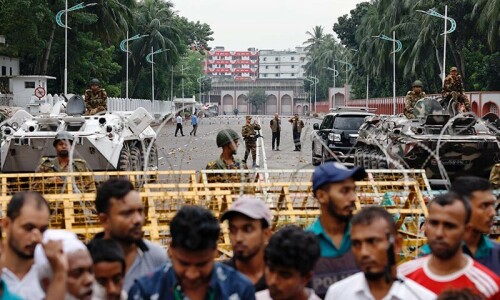SLOWLY and incrementally, the region may be limping back towards relative normality, but there is still much to be done before the current crisis can be deemed to be over.
Yesterday, Pakistan reopened its airspace and major airports in the country outside Punjab. Moreover, the Indian pilot captured after his plane crashed in AJK was repatriated to India as pledged by Prime Minister Imran Khan a day earlier.
Meanwhile, army chief Gen Qamar Bajwa had a number of meetings and telephone conversations with diplomats and military officials of international powers in which, according to a tweet by DG ISPR Maj Gen Asif Ghafoor, the army chief emphasised that Pakistan “shall surely respond to any aggression in self-defence”.
Incongruous, then, was Foreign Minister Shah Mehmood Qureshi’s announcement that he would boycott the OIC’s Council of Foreign Ministers meeting in the UAE because of an invitation by the organisation to Indian Foreign Minister Sushma Swaraj to address the meeting.
Foreign Minister Qureshi’s announcement was by and large supported by the national political leadership in the joint session of parliament — and it could represent a missed opportunity.
In the midst of a crisis with India, to reject an opportunity to put across Pakistan’s point of view to the OIC countries is a decision that will do little to advance this country’s diplomatic position.
Pakistan has improved ties with the UAE, which is hosting the 46th OIC Council of Minister meeting, and Saudi Arabia, which has significant clout in the OIC, after a dip following the Saudi-led war in Yemen.
With those countries also seeking better ties with India, perhaps the UAE summit could have been an opportunity for mediation between India and Pakistan.
And even if India is likely to have baulked at mediation, the OIC ministerial summit has given Ms Swaraj an opportunity to make her case unanswered by Pakistan.
What remains to be seen now is how the Indian government responds to the return of the captured Indian pilot.
The political opposition in India has begun to ask tough questions of the narrative put forward by the BJP-led government of Prime Minister Narendra Modi, but hawkish elements in Indian politics and the media may try and push for further reckless action.
If the peace gesture of Prime Minister Khan is spun as a victory in India, it could create a climate in which the Indian state will not only refuse to reconsider its repressive policies in India-held Kashmir but perhaps be tempted to consider fresh action against Pakistan.
For its part, Pakistan must continue with its measured response of pledging to act only in self-defence, while emphasising the need for peace in the region.
Domestically, the National Action Plan ought to be revived in light of recent events and the fight against extremism be taken up with vigour.
Published in Dawn, March 2nd, 2019












































Dear visitor, the comments section is undergoing an overhaul and will return soon.